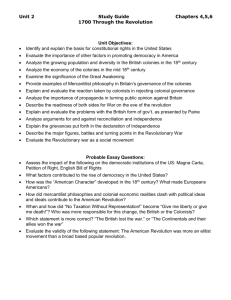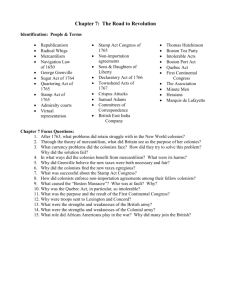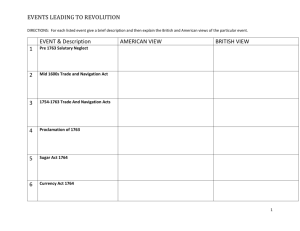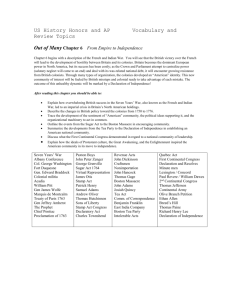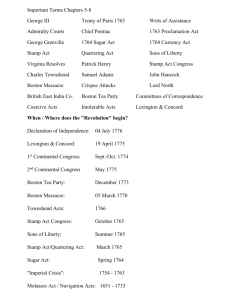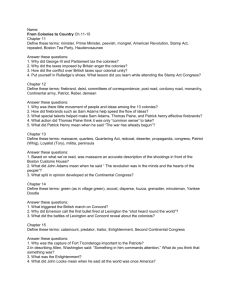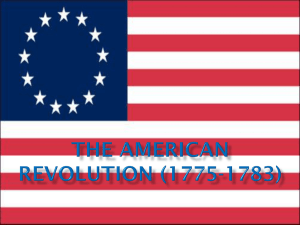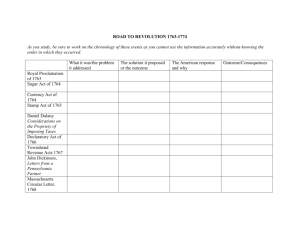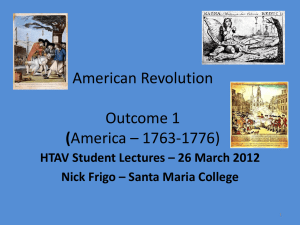Chapter 5
advertisement
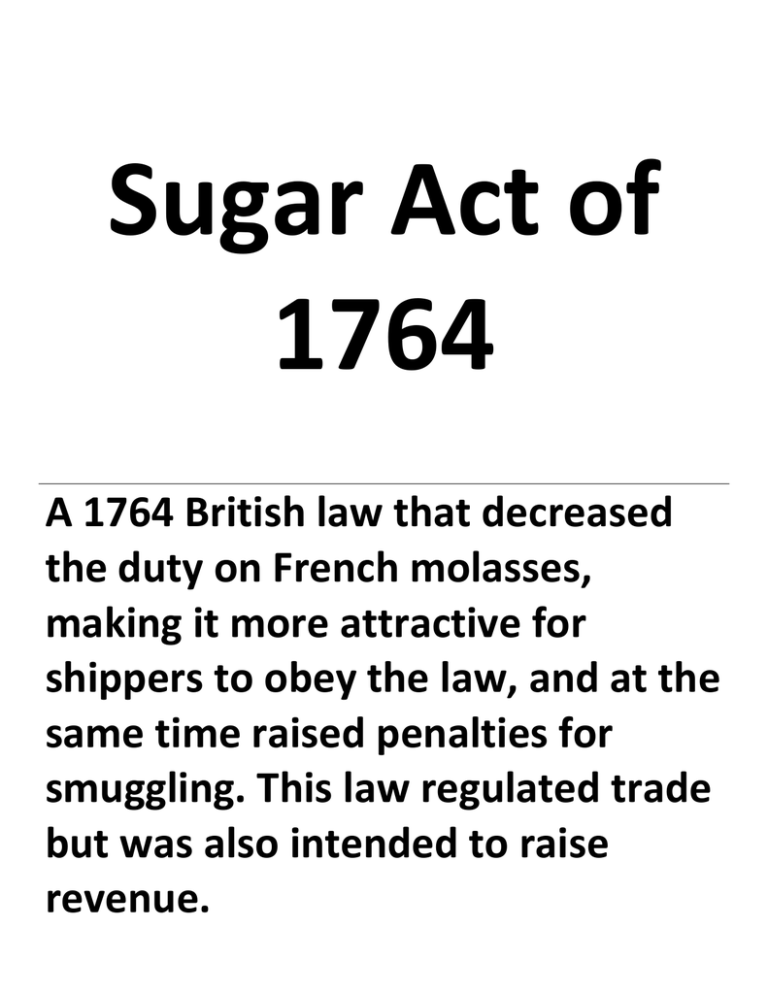
Sugar Act of 1764 A 1764 British law that decreased the duty on French molasses, making it more attractive for shippers to obey the law, and at the same time raised penalties for smuggling. This law regulated trade but was also intended to raise revenue. vice-admiralty courts Tribunals presided over by a judge, with no jury. The Sugar Act of 1764 required that offenders be tried in these tribunals rather than in a common-law tribunal, where a jury decided guilt or innocence. This provoked protests from merchant-smugglers accustomed to acquittal by sympathetic local juries. Stamp Act of 1765 A British law imposing a tax on all paper used for official documents, for the purpose of raising revenue. Widespread resistance to this law led to its repeal in 1766. virtual representation The claim made by British politicians that the interests of the American colonists were adequately represented in Parliament by merchants who traded with the colonies and by absentee landlords who owned estates in the West Indies. Quartering Act of 1765 A British law passed by Parliament at the request of General Thomas Gage, the British military commander in America. It required colonial governments to provide barracks and food for British troops. Stamp Act Congress Delegates from nine assemblies that met in New York City in October 1765 to protest the loss of American “rights and liberties,” especially the right to trial by jury. The congress challenged the constitutionality of both the Stamp and Sugar Acts by declaring that only the colonists’ elected representatives could tax them. Sons of Liberty Colonists—primarily middling merchants and artisans—who banded together to protest the Stamp Act and other imperial reforms of the 1760s. The group originated in Boston in 1765 but soon spread to all the colonies. Declaratory Act of 1766 A law issued by Parliament to assert Parliament’s unassailable right to legislate for its British colonies “in all cases whatsoever,” putting Americans on notice that the simultaneous repeal of the Stamp Act changed nothing in the imperial powers of Britain. Townshend Act of 1767 A British law that established new duties on tea, glass, lead, paper, and painters’ colors imported into the colonies. Imposition of these duties led to boycotts and heightened tensions between Britain and the American colonies. nonimportation movement A February 1768 boycott of British goods by Boston and New York merchants. American women became crucial to the movement by reducing their households’ consumption of imported goods and producing large quantities of homespun cloth. committees of correspondence A communications network established among towns in Massachusetts and also among colonial capital towns in 1772 and 1773 to provide for rapid dissemination of news about important political developments. This politicized ordinary townspeople, sparking a revolutionary language of rights and duties. Tea Act of May 1773 A British act that lowered the existing tax on tea to entice boycotting Americans to buy it. Resistance to this act led to the passage of the Coercive Acts and imposition of military rule in Massachusetts. Coercive Acts Four British acts of 1774 meant to punish Massachusetts for the destruction of three shiploads of tea. Known in America as the Intolerable Acts, they led to open rebellion in the northern colonies. First Continental Congress The September 1774 gathering of colonial delegates in Philadelphia to discuss the crisis precipitated by the Coercive Acts. The congress produced a declaration of rights and an agreement to impose a limited boycott of trade with Britain. Continental Association A group established in 1774 by the First Continental Congress to enforce a boycott of British goods. The group’s boycotts of 1765 and 1768 raised the political consciousness of rural Americans. Dunmore’s War A 1774 war led by Virginia’s royal governor against the Ohio Shawnees, who had a long-standing claim to Kentucky as a hunting ground. They fought a single battle, at Point Pleasant; the Shawnees were defeated, and Dunmore and his militia forces claimed Kentucky. Minutemen Colonial militiamen who stood ready to mobilize on short notice during the imperial crisis of the 1770s. These volunteers formed the core of the citizens’ army that met British troops at Lexington and Concord in April 1775. Second Continental Congress The legislative body that governed the United States from May 1775 through the war’s duration. It established an army, created its own money, and declared independence once all hope for a peaceful reconciliation with Britain was gone. Declaration of Independence A document containing philosophical principles and a list of grievances that declared separation from Britain. Adopted by the Second Continental Congress on July 4, 1776, it ended a period of intense debate with moderates still hoping to reconcile with Britain.
